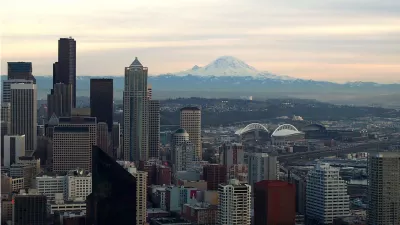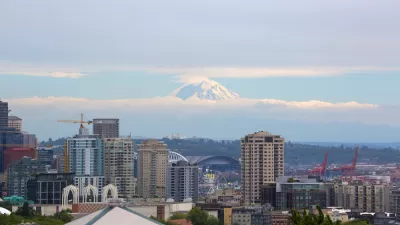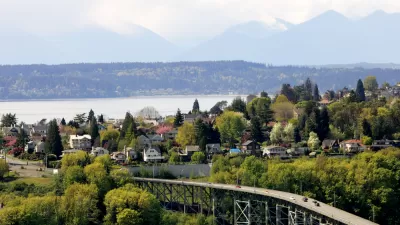The growth of Seattle growth is inflaming passions on either side of the issue—some claim that the city wants everyone to "live in cubicles"; others say the city isn't doing enough to prepare for 120,000 expected new residents.

Nina Shapiro begins this account of residents pushing back against development in Seattle with an obscenity-laced anecdote from the neighborhood of Ballard. The anecdote, says Shapiro, is a sign of growing unrest against the city's current growth patterns, and "others in Ballard—and in neighborhoods across the city that are being similarly transformed—are digging in and doing battle. In Capitol Hill, West Seattle, Eastlake, and elsewhere, residents are banding together, putting up websites and passing around petitions to stop what they contend is runaway, unregulated growth. More than a dozen such groups joined a confederation formed earlier this year called the Coalition for an Affordable, Livable Seattle, or CALSeattle."
On the other side of the issue, "another faction of the city is arguing that the development boom is exactly what should be happening, and if anything is being overregulated. In July, a developer-funded organization called Smart Growth Seattle launched a campaign, complete with video and petition, that rails against City Council members for “decreasing housing supply with legislation that adds more rules, process, limits, and costs... at a time when we are expecting 120,000 new residents."
The long read includes a lot more description of the market implications, politics, advocacy, and passion surrounding the "soul-searching" growth of Seattle.
FULL STORY: The Land-Use Battle That Is Reshaping Seattle

Maui's Vacation Rental Debate Turns Ugly
Verbal attacks, misinformation campaigns and fistfights plague a high-stakes debate to convert thousands of vacation rentals into long-term housing.

Planetizen Federal Action Tracker
A weekly monitor of how Trump’s orders and actions are impacting planners and planning in America.

In Urban Planning, AI Prompting Could be the New Design Thinking
Creativity has long been key to great urban design. What if we see AI as our new creative partner?

King County Supportive Housing Program Offers Hope for Unhoused Residents
The county is taking a ‘Housing First’ approach that prioritizes getting people into housing, then offering wraparound supportive services.

Researchers Use AI to Get Clearer Picture of US Housing
Analysts are using artificial intelligence to supercharge their research by allowing them to comb through data faster. Though these AI tools can be error prone, they save time and housing researchers are optimistic about the future.

Making Shared Micromobility More Inclusive
Cities and shared mobility system operators can do more to include people with disabilities in planning and operations, per a new report.
Urban Design for Planners 1: Software Tools
This six-course series explores essential urban design concepts using open source software and equips planners with the tools they need to participate fully in the urban design process.
Planning for Universal Design
Learn the tools for implementing Universal Design in planning regulations.
planning NEXT
Appalachian Highlands Housing Partners
Mpact (founded as Rail~Volution)
City of Camden Redevelopment Agency
City of Astoria
City of Portland
City of Laramie





























